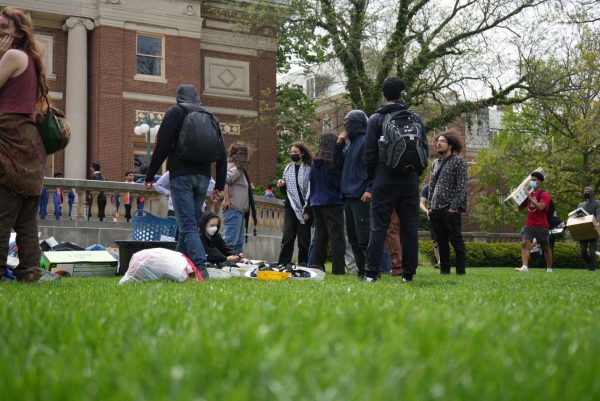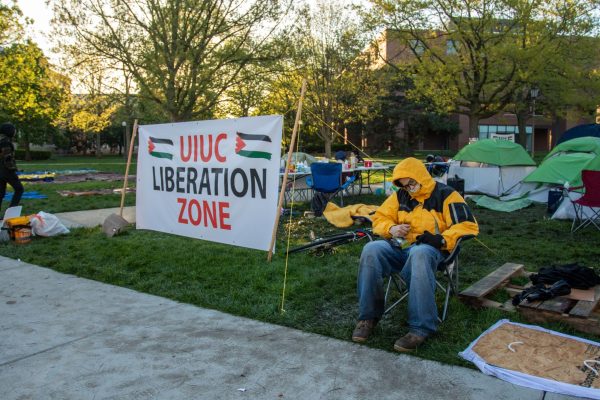UI student powers green energy forward
May 9, 2023
Aman Mehta, junior in Engineering, pushes green energy forward through his research and work at Cache Energy, a startup focused on creating green energy storage technology.
A dark-haired young man with eyes full of passion, Mehta is an international student born in Mumbai, India. A deforestation case in his home city inspired him to pursue his degree and work in the green energy field.
His first interaction with green energy was centered around wind energy in high school, which sparked Mehta’s interest even more.
“That was in high school where there were a lot of limitations in terms of knowledge and infrastructure,” Mehta said. “But over time, we realized what we had done and the need for clean energy in the world.”
Enthusiastic about energy development, Mehta attended the University as an engineering physics major, later switching to mechanical engineering.
Get The Daily Illini in your inbox!
“When I joined the U of I, I was very passionate about energy and the environment right from the beginning,” Mehta said with a smile on his face. “I enrolled as an engineering physics major, and I wanted to take my career toward energy and the environment. However, with time I realized that I wanted to put it into more application, which is why I switched to mechanical engineering.”
Yet, his real introduction to energy and the environment happened when Mehta joined the energy team in the Student Sustainability Committee on campus.
After working with the committee, Mehta found the Sustainability Energy and the Environment Fellows Program, which prepares students for pursuing careers in environmental advocacy groups, according to the University’s website.
The committee opened many more doors for Mehta, one of them being Cache Energy.
“I met the founder of Cache Energy at the Student Sustainability Committee, and, after a few interactions, I started interning with them last fall,” Mehta said.
The startup focuses on developing durable green energy storage technology, according to their website.
Mehta said he joined the company because the startup culture excited him.
“I wanted to get more involved in startup culture just because the kind of implementation that is around startups is a lot faster than any other institution or organization,” Mehta said. “The need for clean energy and green tech is so high that there is an urgency around the creation of this technology.”
As he continued working with the team, Mehta grew to be extremely outgoing and active. The founder and CEO of Cache Energy, Arpit Dwivedi, described Mehta as extremely dedicated to his work.
“Aman is very hardworking, and he has a sense of initiative,” Dwivedi said. “If you give him a project, he will take full responsibility and own it. He’s enjoying the work and we like having him on the team.”
Mehta emphasized the importance of their work at Cache Energy, thinking of it as a solution for the future of the energy industry.
As he continued speaking about the startup, Mehta’s eyes lit up and his voice got louder with passion.
“At the end of the day, we know that the sun doesn’t always shine, the wind doesn’t always blow,” Mehta said. “So, systems to combat that and what we need to move towards a net zero future are these energy storage technologies.”
Mehta continued working on green energy with the Illinois Climate Action Plan, the organization that pushes the University to become carbon-neutral by 2050.
Recently, the organization worked on a building mandate, which recommended that each new building should have a net-zero energy use. Tyler Swanson, the organization’s team clerk, said Mehta came up with the idea.
“It doesn’t matter if we go past the limit, but if we do, we need to make sure the buildings we are constructing aren’t contributing any more greenhouse gas emissions by operating,” Swanson said.
Currently, Mehta and the organization are working on creating a Green Energy Research Committee, which will provide space for students like him who are interested in green energy research.
“When I came in as a freshman, I didn’t know a lot of the things that were going on,” Mehta said. “So we want to create and improve the awareness around all the faculty members who are conducting (green energy) research so that new undergraduate students can get involved in these projects.”
In December 2022, Mehta’s passion for researching unique solutions pushed him to participate in the international sustainability competition “Reimagine Our Future.”
This competition challenged students to generate ideas that tackle one or more of the United Nations’ Sustainable Development Goals. Out of the various goals, lithium extraction drew Mehta’s interest.
“I was trying to figure out some technologies that can be implemented in the world, so we can eliminate all the human rights issues around lithium mining and also the environmental concerns around lithium,” Mehta said. “And that is when I came across this technology where we can literally extract lithium from the geothermal brines, from the steam.”
Leon Liebenberg, Mehta’s former professor and the supervisor of the competition, noted the uniqueness of this idea.
“He eventually ended up with this lithium extraction idea of extracting it from industrial wastewater which, quite frankly, I had not heard of before,” Liebenberg said. “So he taught me a thing or two.”
Mehta and his team ended up winning the competition, with the judges unanimously giving Mehta’s project first place, according to Liebenberg.
When asked about Mehta, Liebenberg smiled, mentioning his amazement from Mehta’s curiosity and unique perspective.
“I’ve known Aman for two years,” Liebenberg said. “I lectured him in one course, and he bugged me incessantly. After every lecture, he would come to me with the most amazing questions and ideas. He sees things which very few other people see.”
Liebenberg said he recommended Mehta for another project supervised by the Illinois Geological Society.
“Last year the Illinois Geological Society approached me and they wanted to know if I know of any top student who would be willing to do experimental work on a brand-new technology, which works on geothermal energy,” Liebenberg said. “And the first name that came to mind was (Mehta). Even though he’s an undergraduate, he sees things differently. He’s not as constrained with his thoughts as a graduate student would be.”
Mehta ended up getting the position, which entails the installation of panels at the Abbott Power Plant.
“If the project goes well, we will be wide-scaling this entire technology throughout the campus,” Mehta said.
Next semester may be full of opportunities for Mehta. He is especially excited about joining the SSC as a board member.
“I was recently interviewed with the Student Sustainability Committee to become a part of the board and, fortunately, I was able to make it through,” Mehta said.
All these efforts are steps towards his goals, one of which is developing clean energy in his home country, according to Mehta.
“As we know, the developed countries can keep building these technologies, but it is really the developing countries that require the implementation of these technologies for the entire world, as one unit, to move to a net zero future,” Mehta said. “So, keeping that in mind, … I would love to pursue a career where I could build something and help the implementation of that in my own country as well.”
Besides working on technological development during his senior year at the University, Mehta aims to spread awareness among students about opportunities on campus and the importance of clean energy.
“Increasing that awareness amongst students like me, who came in as confused freshmen, to have a better idea of what can be done and cannot be done,” Mehta said. “And bringing change in terms of technology on one side, but also awareness and social changes on the other side. I think it’s a mix of two that I really want to dive deeper into over the next year.”







